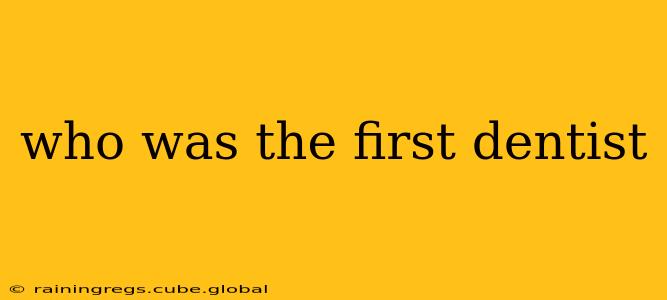The question of who was the first dentist is surprisingly complex, lacking a single definitive answer. The practice of dentistry, in its rudimentary form, stretches back millennia, long before formal qualifications or professional titles existed. Instead of a single individual, we should consider the evolution of dental practices and the individuals who significantly advanced the field.
What Constitutes a "Dentist"?
Before we delve into potential candidates, it's important to define what constitutes a "dentist." Were we talking about someone who simply extracted teeth? Or someone who understood basic oral hygiene and preventative care? Perhaps someone who developed tools and techniques for dental procedures? The definition shapes our understanding of who could be considered the "first."
Early Practices: Evidence from Ancient Civilizations
Evidence suggests that rudimentary dental practices existed in various ancient civilizations:
-
Ancient Egypt (around 6000 BC): Archaeological findings reveal evidence of tooth extraction and rudimentary fillings using materials like gold and shell. However, these practices were likely performed by healers or general practitioners, not specialized dentists.
-
Ancient Mesopotamia (around 5000 BC): Similar findings point to tooth extraction and potential attempts at dental repair in this civilization as well. Again, there's no evidence of a specialized dental profession.
-
Ancient Greece (around 400 BC): Hippocrates, considered the "father of medicine," wrote about dental problems and treatments, though the specifics of his techniques remain somewhat unclear. He didn't specialize in dentistry, but his writings represent an early attempt to systematically understand oral health.
The Emergence of Specialized Dental Practice
The concept of dentistry as a distinct profession emerged much later. While identifying the absolute "first" dentist remains elusive, we can highlight individuals who played crucial roles in establishing dentistry as a recognized and developing field:
- Pierre Fauchard (1678-1761): Often hailed as the "father of modern dentistry," Fauchard published "Le Chirurgien Dentiste," a comprehensive text that systematically described dental techniques, tools, and procedures. This work significantly advanced the field and established a foundational body of knowledge, making him a strong contender for the title of "first dentist" in the modern sense.
Frequently Asked Questions (FAQ)
When did dentistry become a recognized profession?
Dentistry's formal recognition as a distinct profession evolved gradually over centuries. While Fauchard's work laid a crucial foundation in the 18th century, formal dental schools and professional organizations emerged much later, typically in the 19th century.
Who invented the first dental drill?
The development of the dental drill was a gradual process, with various inventors contributing to its evolution. Early versions were hand-cranked and far less sophisticated than modern electric drills. The exact inventor of the first practical dental drill is difficult to definitively pinpoint.
What were the biggest advancements in dentistry throughout history?
Significant advancements include the development of anesthesia (allowing for more complex procedures), the invention of the dental X-ray, improvements in filling materials, and the development of preventative dentistry focusing on oral hygiene.
What are the different specialties in dentistry today?
Modern dentistry includes numerous specialties, such as orthodontics (braces), periodontics (gum disease), endodontics (root canals), prosthodontics (dentures), pediatric dentistry, and oral surgery.
Conclusion
While we cannot pinpoint a single "first dentist," Pierre Fauchard's contribution remains monumental. His work marked a pivotal point in the history of dentistry, ushering in a more scientific and systematic approach to oral healthcare. Understanding the evolution of dental practices across cultures and centuries offers a richer appreciation for the complexities of this vital field.
